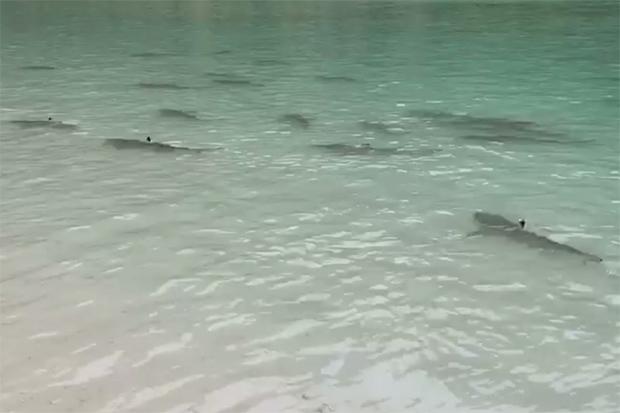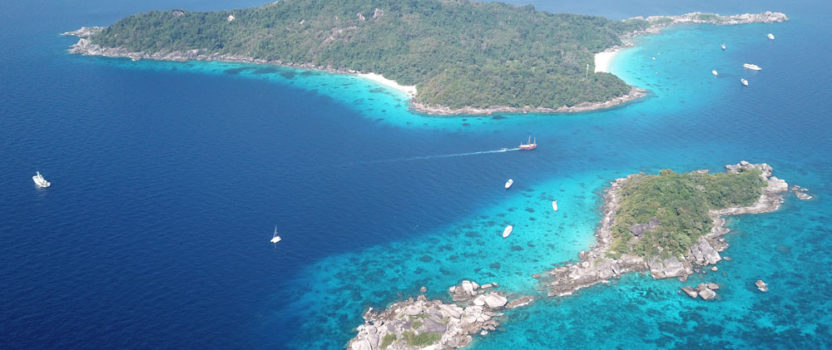Similan Islands National Park Re-opens With New Regulations
The Mu Koh Similan National Park – often referred to as ‘the Similan Islands’ or ‘the Similans’ – re-opened to visitors last week with a raft of new regulations to promote sustainable tourism with the intention of preserving the natural beauty of the islands.
The Similans, part of southern Thailand’s Phang Nga province and most easily accessible from Khao Lak, are a popular tourist destination for divers and non-divers alike. Liveaboards to the region are rated as some of the best diving in the world. The park is closed each year from 16 May to 15 October each year, partly to give the reefs time to regenerate, and partly due to the heavy monsoons which hit the region during this time of year.
According to a report in the Bangkok Post, the new regulations state that a maximum of 3,850 visitors will be allowed into the park each day, 3,325 ‘day tourists’ and 525 scuba divers. In 2017, the report suggests, 912,000 tourists visited the Similans, with up to 7,000 per day at peak times.
To ensure that the quotas are not breached, tickets to enter the national park must be purchased before boarding. Copies of customers’ passports or IDs must be presented at the time of purchase, and are apparently non-refundable meaning that any change of plan or boat will require a new ticket.
All visitors must have insurance before travelling to the national park. Clearly, all divers should have dive insurance but it has not always been mandatory in Thailand. Dive operators will most likely require advance notification of full scuba diving insurance. Some offer daily or weekly insurance packages through a partner company.
Entry-level courses from Discover Scuba Diving (‘intro’ dives) to Open Water certification programmes are now banned in the national park. Certification prior to visiting the Similans is now a pre-requisite. This does not have so much effect on Similans liveaboards except perhaps for non-diving passengers, but it’s certainly a popular activity on day trips.
Overnight stays on the islands are also now prohibited. Again, this does not affect liveaboards who will be able to moor around the Similan and Surin islands as normal. Overnight camping trips have become very popular in recent years but the number of visitors was putting a strain on the island’s resources, especially by the amount of waste generated by tourists. This ban was announced in May after the park closed.
Along with the prohibition on camping and restriction of visitor numbers, single-use plastics have also been banned throughout the Similans National Park, good news for the reefs which have seen a rise in plastic pollution over recent years due to the ever increasing number of visitors.

Maya Bay, Phi Phi, pictured here in 2017, was closed indefinitely to tourists earlier this year (Photo: pixy_nook/Shutterstock)
Similar actions have been taken in recent years to preserve Thailand’s National Parks. Koh Tachai, one of the most accessible of the Similan Islands, was closed ‘indefinitely’ in 2016 and in June this year, Maya Bay in Koh Phi-Phi – popularised by Leonardo DiCaprio in the movie The Beach – has also been closed to tourists.

October 18, 2018 – A school of Blacktip Reef Sharks laze in the shallow waters of Maya Bay in Krabi, where conservationists are trying to restore the tourist-damaged ecosystem. (Photo from Nopparat Thara Beach-Phi Phi Islands – https://www.youtube.com/watch?v=_pDzxl7c18w)
The new restrictions placed on the Similans are undoubtedly beneficial to the islands’ reefs, but not all operators are impressed. One tour company boss is reported in online journal The Nation as stating that he’s had to lay off 120 employees as a result of the new regulations. The Bangkok Post also reports that the new regulations caused ‘chaos’ at the ticketing offices, with some staff ticketing staff unprepared to handle the new regulations, which have been implemented at short notice.
Similan National Park chief Ruamsin Manajongprasert said: ‘Since Tachai Island is closed to all visitors due to environmental damage caused by tourism activities, the Similan Islands are the destination where the mass groups of tourists are diverted to.
‘Therefore, the National Park, Wildlife and Plant Conservation Department [DNP] decided that it was now time to come out with tougher tourism management rules in order to ensure that tourism activities at Mu Koh Similan National Park will be sustainable and cause less harm to the fragile ecosystems of the islands.’
Potential visitors are advised to book early to avoid disappointment, and customers with existing pre-booked holidays to the Similans are advised to contact their tour operators to check if they are potentially affected by the new regulations.



Leave a Reply
Your email is safe with us.